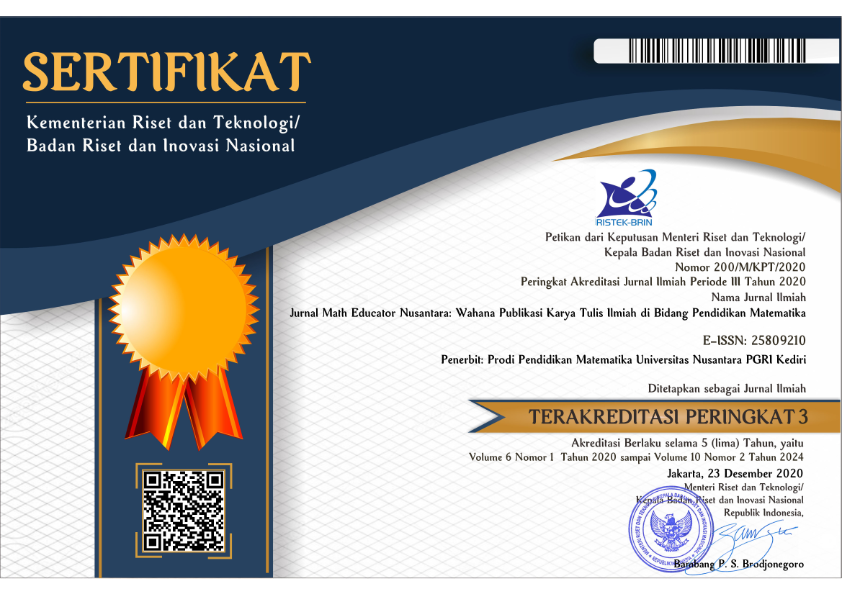Development Of A Steam-Based Mathematics E-Module To Improve The Critical Thinking Skills Of Class IV Primary Students
DOI:
https://doi.org/10.29407/jmen.v10i2.22816Keywords:
E-module, STEAM (Sciences, Technology, Engineering, Art, dan Mathematics), Critical thinking, MathematicsAbstract
This research aims to add learning resources that can stimulate students' critical thinking by developing a STEAM-based mathematics e-module on measurement material. The method used is Research & Development with the ADDIE model. The feasibility and effectiveness of the product are the main focus in research involving material, media, language and educator experts. Through the validation process, the product is tested on students to test its effectiveness. The research results show a) based on the overall percentage of material experts 84.89%, media experts 94.90%, language experts 78.67%, and teacher validation 96.52% so that the e-module is suitable for use. b) e-modules are quite effective from the post-test results with 46.4% in improving critical thinking skills. The STEAM-based mathematics e-module with measurement material was declared suitable for use and quite effective for students.
References
Ahdhianto, E., Masula, S., Thohir, M. A., & Khotimah, K. (2024). Development of PBL-based e-modules to improve problem-solving and critical thinking skills of elementary school students. Jurnal Math Educator Nusantara, 10(1), 167–178. https://doi.org/https://doi.org/10.29407/jmen.v10i1.22376
Aswirna, P., Fahmi, R., Samad, D., & Tamala, N. (2022). Pengembangan E-Modul Fisika Berbasis Model Trait Treatment Interaction Terhadap Keterampilan Berpikir Kritis. Natural Science: Jurnal Penelitian Bidang IPA Dan Pendidikan IPA, 8(1), 39–49. https://ejournal.uinib.ac.id/jurnal/index.php/naturalscience/article/view/3637
Damayanti, N., Roza, Y., & Maimunah, M. (2022). Analysis of Needs for the Development of Ethnomathematic E-Modules Based on Riau Malay Culture To Facilitate Mathematic Literature Ability of Sma/Ma Students. Jurnal Pendidikan Matematika Dan IPA, 13(2), 244. https://doi.org/10.26418/jpmipa.v13i2.50396
Gunawan, D., Sutrisno, & Muslim. (2020). Pengembangan Perangkat Pembelajaran Matematika Berdasarkan TPACK untuk Meningkatkan Kemampuan Berpikir Kritis. Jurnal Pendidikan Matematika, 11(2), 249–261. https://doi.org/http://dx.doi.org/10.36709/jpm.v11i2.11518
Gunawan, P. (2019). Model pembelajaran STEAM (Scient, Technology, Engineering, Art, Mathematics) dengan pendekatan saintifik. In Model Pembelajaran STEAM (pp. 1–64). https://repositori.kemdikbud.go.id/18456/1/model-pembelajaran-steam-science-teknologi-engineering-art-dan-matematics-dengan-pendekatan-saintifik %281%29.pdf
Jannah, M., & Julianto, J. (2018). Pengembangan Media Video Animasi Digestive System Untuk Meningkatkan Hasil Belajar Siswa Mata Pelajaran Ipa Kelas V. Jurnal Penelitian Pendidikan Guru Sekolah Dasar, 6(2), 124–134.
Kirk, M., Tytler, R., & White, P. (2023). Critical thinking in primary science through a guided inquiry pedagogy: A semiotic perspective. Teachers and Teaching: Theory and Practice, 29(6), 615–637. https://doi.org/10.1080/13540602.2023.2191181
Kowiyah, K. (2016). Peningkatan Kemampuan Berpikir Kritis dalam Pemecahan Masalah Matematis Menggunakan Pendekatan Open Ended. Jurnal Inovasi Pendidikan Dasar, 1(2), 67–74. https://doi.org/ttps://doi.org/hhttps://doi.org/10.2223 6/jipd.v1i2.19
Kowiyah, K., Marini, A., & Wihardjo, S. (2020). Rasch Model Analysis of Critical Thinking Instruments for Elementary School. ICEMS. https://doi.org/10.4108/eai.30-9-2019.2291176
Kurniawati, D., & Ekayanti, A. (2020). Pentingnya Berpikir Kritis dalam Pembelajaran Matematika. PeTeKa (Jurnal Penelitian Tindakan Kelas Dan Pengembangan Pembelajaran), 3(2), 107–114. https://doi.org/http://dx.doi.org/10.31604/ptk.v3i2.107-114
Maydiantoro, A. (2021). Model-Model Penelitian Pengembangan (Research and Development). Jurnal Pengembangan Profesi Pendidik Indonesia (JPPI). http://repository.lppm.unila.ac.id/34333/1/Model-Model Penelitian dan Pengembangan.pdf
McIntyre, T., Wegener, M., & McGrath, D. (2018). Dynamic e-learning modules for student lecture preparation. Teaching and Learning Inquiry, 6(1), 126–145. https://doi.org/preparation. Teaching and Learhttps://doi.org/10.20343/teachlearn inqu.6.1.11
Nissa, N., Dimas, A., & Anfa, Q. (2023). Pengembangan E-modul IPA Berbasis POE ( Predict, Observe, Explain) Untuk Meningkatkan Kemampuan Berpikir Kritis Siswa Pada Materi Pesawat Sederhana. Jurnal Ilmiah Pendidikan IPA, 5(2), 180–189.
Novitasari, K. W. A. (2023). Analisis Keterampilan Berpikir Kritis Menurut Indikator Facione Pada Pembelajaran Kimia Daring Dan Luring. Jurnal Sains Riset, 13(3), 839–849. https://doi.org/10.47647/jsr.v13i3.2017
Saputra, E., Jamilah, & Susiaty, U. D. (2022). Pengembangan E-Modul Etnomatematika Berbasis Model Pembelajaran Inquiry Terhadap Kemampuan Berpikir Kritis Siswa. Jurnal Riset Rumpun Matematika Dan Ilmu Pengetahuan Alam, 1(1), 56–63. https://doi.org/10.55606/jurrimipa.v1i1.176
Saputro, B. (2017). Manajemen Penelitian Pengembangan (Reserach & Development) Bagi Penyusun Tesis Dan Disertasi (Issue Januari).
Sherly, Dharma, E., & Sihombing, H. B. (2020). Merdeka Belajar: Kajian Literatur. Konferensi Nasional Pendidikan, 183–190. https://proceeding.urbangreen.co.id/index.php/library/article/view/33
Susanti, V. D., & Adamura, F. (2020). Pengembangan Perangkat Pembelajaran Kooperatif berorientasi Brain Based Learning untuk Melatih Kemampuan Berpikir Kritis Matematis Siswa. Jurnal Pendidikan Matematika Dan Ipa, 11(1), 75–85. https://doi.org/dx.doi.org/10.26418/jpmipa.v11i1.32717
Tri Wahyuni, I., Sari, P. M., & Kowiyah, K. (2021). Identifikasi Keterampilan Berpikir Kritis Siswa Pada Pembelajaran Ipa Di Sdn Gugus 1 Kecamatan Duren Sawit. Jurnal Pendidikan Dasar, 12(01), 12–22. https://doi.org/10.21009/jpd.v12i01.17461
Turnip, R. F., Rufi’i, & Karyono, H. (2021). Pengembangan E-modul Matematika Dalam Meningkatkan Keterampilan Berpikir Kritis. Jurnal Edukasi Matematika Dan Sains), 9(2), 485–498. https://doi.org/10.25273/jems.v9i2.11057
Wulandari, F., Yogica, R., & Darussyamsu, R. (2021). Analisis Manfaat Penggunaan E-Modul Interaktif Sebagai Media Pembelajaran Jarak Jauh Di Masa Pandemi Covid-19. Khazanah Pendidikan, 15(2), 139. https://doi.org/10.30595/jkp.v15i2.10809
Yuniarti, V. F. M., Anriani, N., & Santoso, C. A. H. . (2020). Pengembangan E-modul Berbasis Smartphone Pada Materi Integral Tak Tentu Berorientasi Keterampilan Abad Ke-21. JARTIKA Jurnal Riset Teknologi Dan Inovasi Pendidikan, 3(2), 222–233. https://doi.org/10.36765/jartika.v3i2.253
Downloads
Published
Issue
Section
License
Authors who publish with this journal agree to the following terms:
- Copyright on any article is retained by the author(s).
- The author grants the journal, the right of first publication with the work simultaneously licensed under a Creative Commons Attribution License that allows others to share the work with an acknowledgment of the work’s authorship and initial publication in this journal.
- Authors are able to enter into separate, additional contractual arrangements for the non-exclusive distribution of the journal’s published version of the work (e.g., post it to an institutional repository or publish it in a book), with an acknowledgment of its initial publication in this journal.
- Authors are permitted and encouraged to post their work online (e.g., in institutional repositories or on their website) prior to and during the submission process, as it can lead to productive exchanges, as well as earlier and greater citation of published work.
- The article and any associated published material is distributed under the Creative Commons Attribution-ShareAlike 4.0 International License













